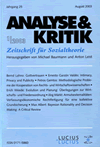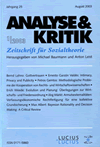Suchergebnisse
"Ivo Wallimann-Helmer"
Titel: Comment on Gavin Kerr
Autor: Ivo Wallimann-Helmer
Seite: 93-97
Not Losing Major Liberal and Rawlsian Insights
Abstract: In this comment I challenge Kerr’s claim that a coherent expression of a ’liberalism of freedom’ needs an extended first Rawlsian principle of justice incorporating the principle of fair equality of opportunity for two reasons. First, such an extended first principle leads to illiberal consequences by narrowing down the scope of individual responsibility for choice and effort way too much. Second, such an extended first principle misses a main Rawlsian insight, namely that in a theory of justice the principle securing basic liberties and the principle of fair equality of opportunity serve different purposes.
Titel: Environmental Inequalities and Democratic Citizenship: Linking Normative Theory with Empirical Research
Autor: Fabian Schuppert / Ivo Wallimann-Helmer
Seite: 345-366
Abstract: The aim of this paper is to link empirical findings concerning environmental inequalities with different normative yard-sticks for assessing whether these inequalities should be deemed unjust, or not. We argue that such an inquiry must necessarily take into account some caveats regarding both empirical research and normative theory. We suggest that empirical results must be contextualised by establishing geographies of risk. As a normative yard-stick we propose a moderately demanding social-egalitarian account of justice and democratic citizenship, which we take to be best suited to identify unjust as well as legitimate instances of socio-environmental inequality.
Titel: Comment on Andrew Lister: Just Distribution(s) for Mutual Recognition
Autor: Ivo Wallimann-Helmer
Seite: 113-122
Abstract: This comment questions Lister's reading of the reciprocity condition in three respects. First, it challenges the view that this condition necessarily leads to egalitarian claims about just distribution. Secondly, it questions Lister's argument that the reciprocity condition is linked to substantial schemes of egalitarian distribution irrespective of context. Thirdly, it claims that entitlements to justice for people with mental or psychological impairments cannot be based on a distinction between willingness and unwillingness to contribute to the cooperative venture of a society.

Property-Owning Democracy
2013 (35) Heft 1
Guest-Editors: Francis Cheneval / Christoph Laszlo
Editorial
In recent years, ’property-owning democracy’ (POD), defined by widespread ownership of productive assets, has become one of the key-factors in the assessment of the institutional design implied in John Rawls’s theory of justice. The wider implications of this inquiry also engage scholars who do not subscribe to Rawls’s conception of justice but are broadly interested in normative questions of political economy and the basic structure of a just polity. In the course of this debate, the in...

Work and Cooperation
2011 (33) Heft 1
Editorial
Both in social theories with the aim of looking into the creative core of society as well as in everyday politics, two intuitions often supplement each other. The first intuition, empirico-analytical, views common organization of work and production as being the very aim of society, and other parts of society being explicable from this. A second intuition, ethical or moral, holds the sphere of work to be the central site for diagnoses of a society's inherent justice. Both intuitions not only con...